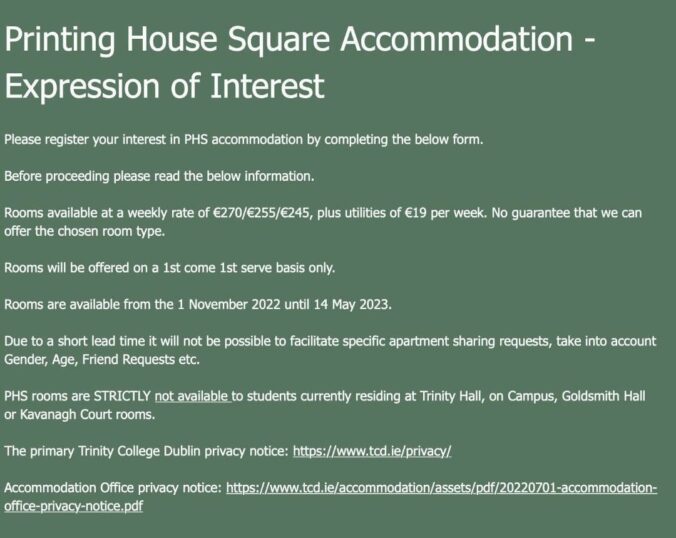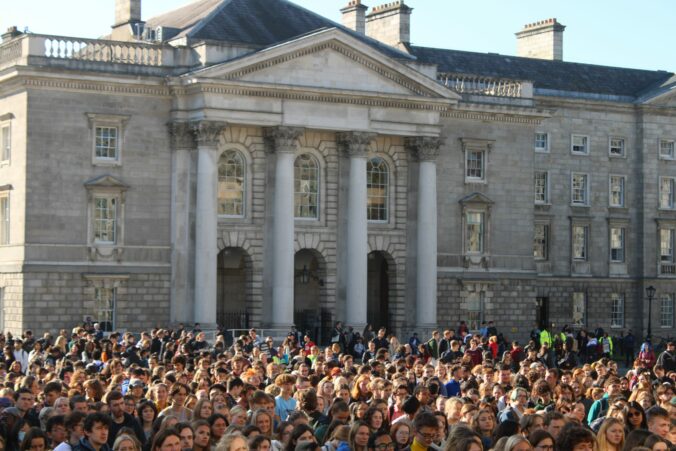Leftist students for social progress.
Category: Fees
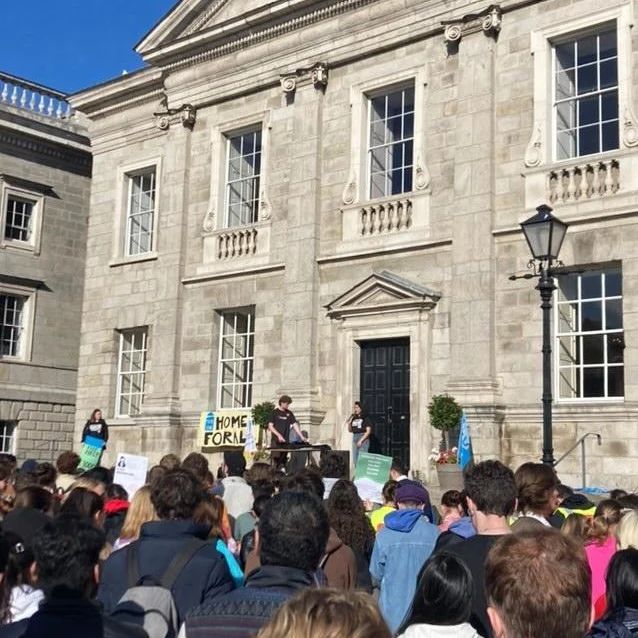
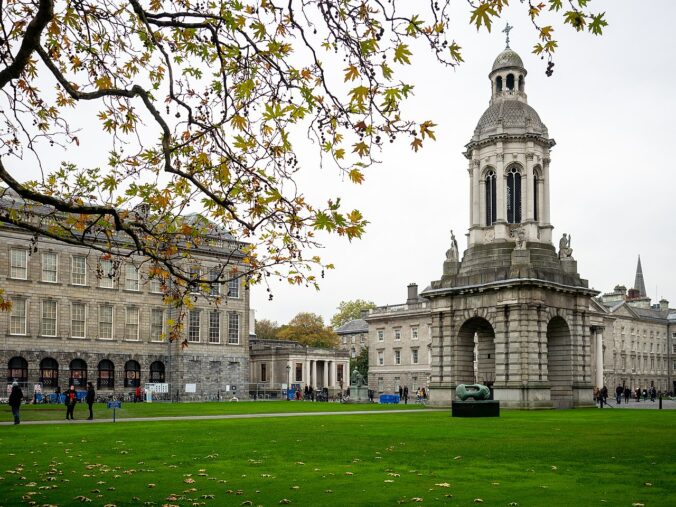
Commercialization of Trinity College Dublin – Profiteering from Students
WHERE IS OUR MONEY GOING?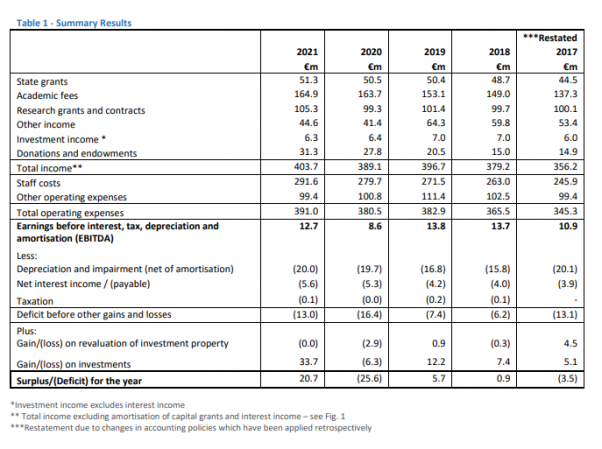
The accounts of Trinity College Dublin for 2020-2021 state a surplus of € 20.7 million.
If the aforementioned figures are correct, what on earth is a university doing to make a € 20.7 million surplus a year?
Who is profiting from these surpluses and reserves, and how are they being spent?
The topic of this flyer is commercialization. While senior management have undoubtedly played a huge role in driving commercialisation of the sector, the government is also at fault. The philosophy of the private sector applied onto education is at the root of many issues that we face, such as underinvestment in mental health supports, discriminatory accommodation strategy, fee increases and the lack of protective measures for students.
Tuition fees for third-level were abolished in the mid-1990s, however, this has resulted in the government being tempted to slowly cut funding.
While student numbers increased, so did taxpayer’s investments into universities, but the overall money available per-student has been decreasing. For example, spending per student at third-level decreased from €10,806 in 2007 to €7,089 in 2016, a drop of 34.4%.
This is despite the fact that between 2007 and 2016, public spending on education increased by 5.1%. It is simply not enough, and this has resulted in the corporatization of universities, where they have to make up for the loss of state funding by operating like for-profit businesses, cutting courses and downsizing services like counselling.
TCD ACCOUNTS STATE A RESERVE OF € 812 MILLION
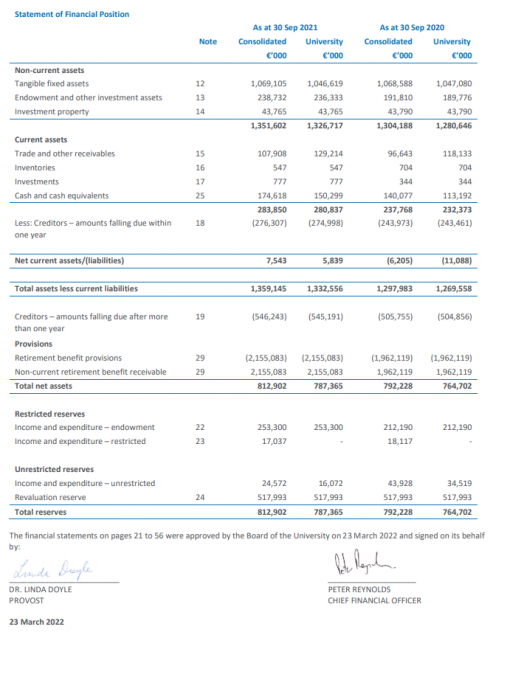
WITH € 174 MILLION IN CASH…

Money-making is at the heart of these pursuits. So, for example, with the lack of hybrid learning, it can be tied to factors such as:
This is otherwise known as the profit motive. Let’s take a look at a couple more examples of how this affects us as students.
Accommodation
The profit from Trinity residences, including Trinity Halls, Kavanaugh Court and much of the on-campus accommodation, totaled around € 10 million in 2021. The rent for a student to stay in one of these residences can be above € 10,000 a year. With that in mind, the extortionate pricing of student accommodation has to come under serious scrutiny. It’s time we start asking why the accommodation is being run at such levels of profit. The only charges, if any given the already incredibly high student fees, should be just enough to cover maintenance and repairing costs. Nothing more.
It is also worrying that students have no rights in these accommodations, enjoying only the legal protections that a hotel would have.
Recently, College have sent emails to staff and alumni asking them to rent out digs, which have little to no protections, for tax rebates of up to € 14,000 a year through the neoliberal government’s Rent-A-Room scheme. This will mean that students would have to pay up to that extortionate amount to stay in one of these places.
Perhaps the most obscene display is that while the student rate for the summer – extensions and early arrivals – ranges from € 24.82 to € 34.13 per day, Trinity is clearly exploiting and advertising to vulnerable students sitting reassessment at € 45 a night. This is appalling, and the rate should be reduced, since we should be supporting students doing resits.
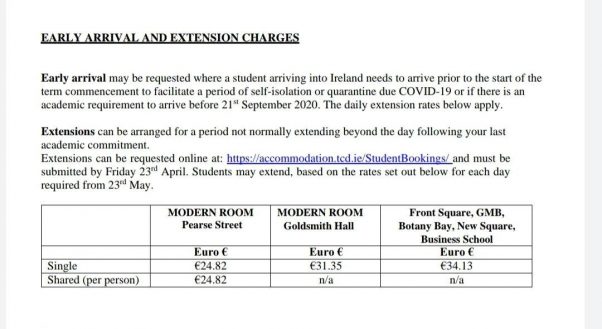
Mental Health
Despite the high surpluses being run by Trinity, and the massive reserves which they sit on, many vital student services have been underfunded to the detriment of students. One of the key concerns highlighted by students is the months-long waiting times at College Counselling and Health Services. College should properly fund our welfare supports from the money they control.
Tuition Fee
Year on year, our tuition fees increase. The most recent fee increase is 2.3% over a 4-year period for non-EUs and postgraduate students, with a fee freeze in 2022-2023 but starting in 2023-2024. This will come out to an around 10% fee increase, worth € 2000 to € 5000 euros over the course of study. A non-EU international student in Dublin can already be expected to pay around € 30,000 to € 50,000 just for the tuition fee and rented accommodation. That is insane. To have the audacity to further increase this is beyond comprehension.
Casualization
The term precarious staff refers to any university worker who shares insecure working conditions (these could be teachers, tutors, researchers, cleaners, caterers, hospitality or admin staff) that leave them underpaid, vulnerable and living with the constant risk of unemployment. Casualization refers to the casual forms of employment which leave people in this insecure position. It can also refer to outsourcing. For example, in our College estates 20.5% of all cleaning staff are outsourced, and 14.28% of security staff. The University in total has employed over 2,500 staff on casualized, short-term and hourly-paid contracts, leaving them in a precarious condition. When the institution decides to no longer rely upon its casualized workers, it can dispose of them easily. Student learning conditions are staff working conditions, and we should stand in solidarity with our teachers.
Student Levy
Many, especially postgraduates are struggling. In addition to the Students Levies and Charges (SLC), which includes the Sports Centre Development charge (€120), students pay increasingly large booking fees in order to use those same facilities.
“I play badminton with ~8 other SoP postgraduates every week or so, and we pay €10 per hour per court, with an additional €6 tacked on per hour per court if we bring non-members. And if we want to borrow a badminton racquet? Another €5 per booking, supposedly to dissuade equipment theft. These costs add up quickly and place financial strain on students,” says a student.
It’s not just badminton. The rock climbing wall, the basketball and tennis courts, the classes—anything outside of the pool and weight-lifting facilities—students have to pay extra for it. As if students weren’t already poor enough, and as if we didn’t already contribute to 88% of Trinity Sports Centre (TSC) income.
This is all while the Provost is paid € 800 a day, with the senior management team taking home €2.5 million in just one year in 2020-2021 during the pandemic. It is greedy, disrespectful and unacceptable.
APPEAL TO PROVOST: STOP FEE INCREASES, EXPLOITATIVE RENT AND RESPECT STUDENTS AND STAFF!
APPEAL TO ALL STUDENTS: SUPPORT PROTESTS, PUT PRESSURE ON THE HIERARCHY AND ORGANISE!
As the cost of education has increased, 11,189 students and their families have fallen in arrears during the Covid-19 pandemic across Ireland. This number was obtained following 33 Freedom of Information (FOI) Act 2014 requests to all third-level institutions in the Republic and the North of Ireland. The responses we received indicate a 67% increase in fee and university-owned rent arrears from 6,678 in 2018-2019 to 11,189 in 2020-2021. Students4Change is sharing these worrying figures and calls for immediate action to organise against this capitalist government and for socialist power.
The data shows that students and their families across the country are struggling, and that supports during the Covid-19 pandemic were not adequate to prevent many from entering into the downward spiral of due arrears. An ILCU study in 2019 surveying students revealed that 24% say finance is their biggest worry, and 74% say they have to work during the academic term to cope with costs. 42% rely on their families to fund their studies [1]. This was only made worse with the pandemic and its financial aftershock, when many lost out on vital income. Such financial troubles risk taking a serious mental and physical toll on students and their families.
We further believe that the debt disproportionately affects medical- and nursing students and those in the arts and design courses where there are many hidden costs including the cost of equipment, materials and renting of studio spaces. The actual figures are also likely to be higher than disclosed, since 4 institutions refused to share university-owned accommodation rent due to the data residing in private subsidiaries which are not subjected to the 2014 FOI Act.
The rent and fee arrears of today are carried onto the graduates’ lives as debt in the future, especially when considering skyrocketing accommodation, non-EU and postgraduate fees. In the North of Ireland, a 2022 report indicates that students are leaving university with close to six-figure debts [2], while a 2017 article revealed that in the Republic students owe thousands of euros [3]. A 2016 Union of Students Ireland (USI) survey found that 60% of parents get into debt funding third-level education [4].
László Molnárfi, Chairperson of Students4Change, said “The political consciousness of the student movement has been so far to cooperate with the neoliberal coalition. This has miserably failed the students of Ireland. Photo-shoots with Minister Harris or any other politician from the FF/FG/Greens has led to nothing but empty promises from the government. Such actions will not lead to change being made, since being ‘respectable’ or being in with them will not make them listen to us. While they are preoccupied with stunts, students on-the-ground are struggling as evidenced by the sharp increase in the number of those in fee and rent-related arrears. Instead, we must agitate against the enemies of students, workers and our communities. We are under attack and this must be met with the most severe fightback. Nothing should be off the table – strikes, marches and occupations to realise our demands. We demand free, public and democratic education for all!”.
Original data linked here, in the Students4Change FOI database, in the ‘Rent and Fee Arrears’ folder on Google Drive. Also present in that folder is two Excel analysis sheets and the FOI template we used.
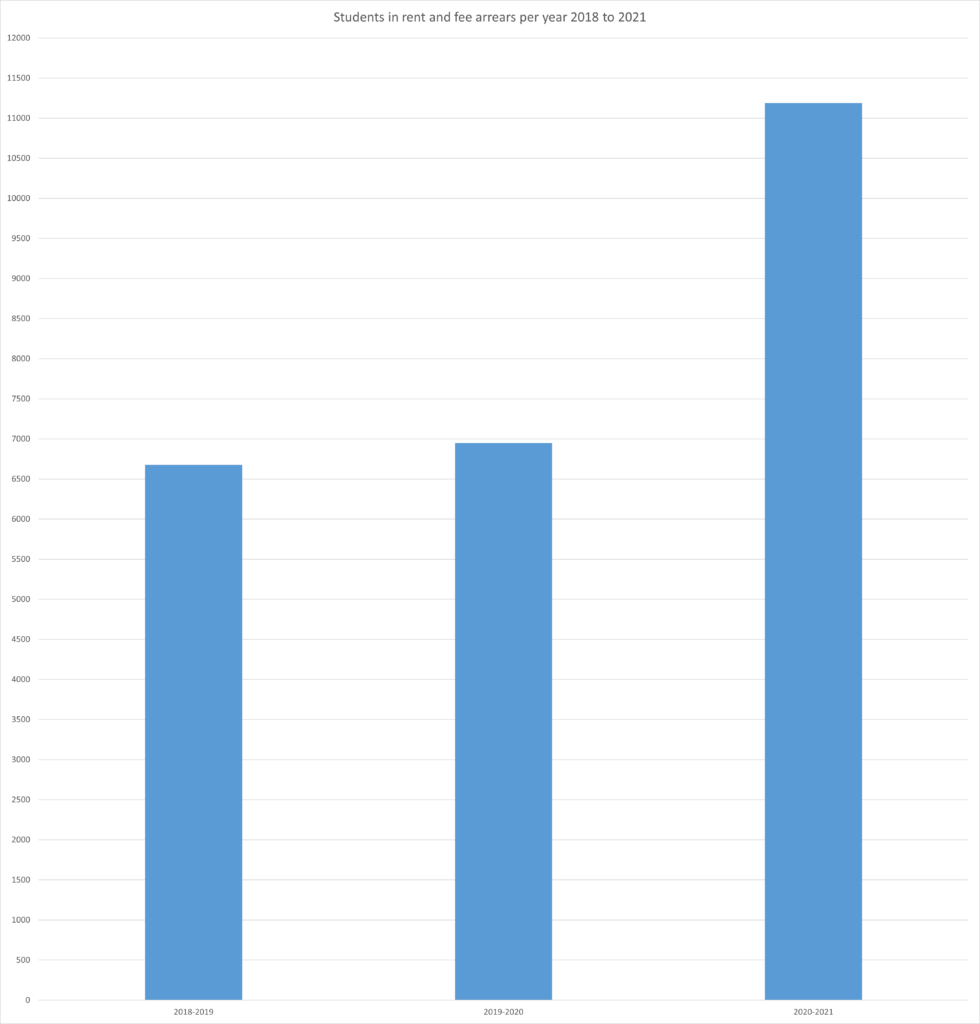
Source(s):
[1] https://www.creditunion.ie/news/latest-news/ilcu-survey-on-college-costs/
[4] https://usi.ie/education/60-of-parents-get-into-debt-funding-third-level-education/
This is our “student partnership”. After the recent defeat of the same proposal through the work of TCDSU, GSU and S4C, they kept re-running the vote at Board until they knew opposition would die, or those who dissent would be absent, and their agenda would be pushed through. Disgraceful.
A non-EU international student in Dublin can already be expected to pay around 30,000 to 40,000 euros just for the tuition fee and rented accommodation. That is insane. To have the audacity to further increase this is beyond comprehension. No wonder many leave after they get their degrees.
We know students who are being evicted, who are struggling to pay for groceries, and who are at risk of not getting their degrees due to the tuition fee arrears.
According to an FOI request we filed, the number of students in rent or fee arrears shot up to 250 or so during the pandemic. In the face of this, our College has decided to further push us into precarity. The government’s complicity cannot be understated either, as they transformed our universities into for-profit businesses through decades of underfunding.
As a response, we need to boycott the Student Partnership Agreement, which is nothing but a piece of paper that offers students no protections, but is a great PR booster for College. To this end, we have launched a petition.
We invite the TCDSU to boycott the SPA, not just because of the fees, but because due to the HEA Bill 2022, we will lose the Education Officer and Welfare Officer from the Board in the time of the aftershock of a pandemic. Decisions like this will meet even less opposition. As such, we need decisive action.
We also invite the TCDSU to reconsider their political strategy. They should have organised a pre-emptive protest if they knew the 2.3% fee increase was imminent. However, they didn’t tell the union members, S4C, the GSU (who were ill at the time), or the press.
We need to revisit our political strategy because what we are doing isn’t working.
Sign the petition!
The fee increase is a 2.3% over a 4-year period, with a fee freeze in 2022-2023 but starting in 2023-2024.
Board of @trinitycollegedublin is discussing a 10% increase at the moment. We were not many at the protest today, but we will build until our numbers grow. Let’s unite with staff in opposition to the commercialization of academia and let’s protect our communities.
This fee increase will hurt the most vulnerable and presents a further barrier to accessing education. Students are being evicted because they can’t pay rent. Students are struggling to pay for groceries. Students are being left behind. The pandemic has only compounded this issue. Rent hikes, the student contribution fee, and international fees, all of which have gradually but greatly increased over the past decades, have made it so that students and their families (who may have also suffered unemployment because of Covid-19) struggle to pay College-related expenses. Many take up part-time jobs or student loans, but even this is not enough. In our College, during the pandemic, more than 250 students were in rent or fees arrears.
We must organize in grassroots groups, political associations, trade unions. Corporatization must be resist. We cannot and will not yield.
Students4change COMMITTEE AFTER PROTEST, BEFORE HEARING NEWS THAT 9 board members dissented and the fee increase proposal was scrapped.
University Times article here.
If the redirect is not working, click here.
- Apologize to students for the unclear and late communication concerning the re-opening plan, which conveyed a lack of care for students’ needs and a preoccupation with increased revenues.
- Provide more in-person lectures through using TCD’s unused real estate properties to hold classes provided the Covid-19 regulations allow, or alternatively, refund students for the loss of their in-person tuition and the educational experience that they paid for in 2021-2022, per module. Return or Refund!
- All lectures below 150 should be in-person. All tutorials should be in person.
- Do the best to ensure that timetables do not have in-person and online classes mixed on the same day.
- Work together with the TCD Students’ Union, Graduate Students’ Union, IFUT and lecturers to find a solution for handing over copyright of recorded lectures to lecturers, so as to enact a democratically-approved policy of courses being recorded for inclusivity, mental health reasons and for students with extenuating circumstances who otherwise can’t come back on-campus.
- This should be a personal choice, especially with the unavailability of accommodation and many students commuting, and should require no justification. This will also reduce stress for on-campus facilities.
- Students living in Trinity-owned accommodation should be allowed to have overnight guests and host guests as per government policy.
- Library capacity to operate at close to full capacity and students shouldn’t have to book in, the same for sports clubs and societies. They should also follow their pre-covid opening and closing hours, and time allowed to spend in the library should not be limited.
- Free repeats for those who failed last year due to the difficulties associated with Covid-19.
- Refund of the student contribution fee from last year for undergraduate and postgraduate students.
- Increase mental health spending to fix 40+ days wait times at the counselling services.
- As a compensation for the disregard of students during the pandemic, TCD should give us access to ALL recorded lectures and materials from our respective Schools, so as to make up for the loss of our education (due to its decline in quality due to online learning) with access and opportunity for more education.
This list of demands was written collectively by Students 4 Change, TCDRU, TCD F2F and the feedback of students. It also incorporates the demands of TCDSU as listed in their press release on the 14th of September and that of the postgraduate demands as outlined in the GSU press release on the 19th of September.
The new government policy‘s implementation in Trinity College Dublin for the re-opening of third-level education is disappointing. It is about time that we demand either a proper University experience or refunds like students in the U.K did (see e.g. UCL, UoM rent strikes, occupations and other direct action in addition to legal action).
In fact, there should have been last year too such demands, but no protest movement or radical union was there to fight for the cause.
We have created a petition outlining these demands on Uplift.ie.
We demand that:
Due to the approach to the Covid-19 regulatory framework for education that Trinity College Dublin (TCD) is taking, many students will not be able to access in-class lectures due to their large class sizes. We, as TCD students, are asking for provisions to refund a part of the student contribution fee for those affected by the continued substitution of in-person learning for digital learning.
Our reasoning is as follows:
The current regulatory framework says that “larger lectures can happen within limits linked to reducing the size or capacity of very large lecture halls” and does not consider larger lectures necessary in-person activities due to public health advice and leaves it up to institutions to “determine how best to do this in their own context”. Trinity College Dublin (TCD) has considered the health advice as it applies to their situation and announced that large lectures above 150 will not be held in-person and some lectures between 50 and 150 are up to the “discretion” of individual Schools.
If TCD has considered the current public health advice and deems that many students will not return to in-class learning, then a partial refund for students makes sense. Students have been milked for money for way too long for education.
More facts and statistics:
The last 18 months have been very hard on third-level students, both academically and mental health-wise. A survey conducted in March 2021 found that more than 90 per cent of students are struggling with loneliness, stress and are feeling disconnected with the system of online learning. This is not to mention the frustrations felt by many students as they were required to pay large sums of money for a University experience which was of much lower quality due to online learning.
To many, the news of this reopening plan comes as a disappointment, and students feel neglected by the government as their hopes of a full return to campus are crushed, especially as UCD is fully re-opening.
The fair alternative is the partial refund: Students have been milked for money for way too long for education that is of worse quality, and have been consistently promised a return to in-person learning, which they look forward to – as such, they deserve it.
Sign the In-Person Lectures or Refunds petition here!
In addition, the following are action point(s) which you can take to help the campaign:
- Share this site and petition into your course group chats, so as to spread awareness of the issue and encourage people to give their signatures to the petition.
- Share this site and the petition on your social medias, as posts and stories, with the hashtag #InPersonLecturesOrRefunds.
© 2025 Students4Change
Theme by Anders Noren — Up ↑
